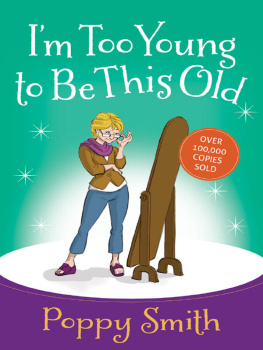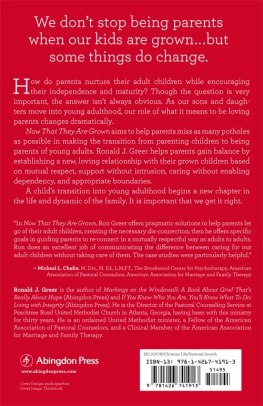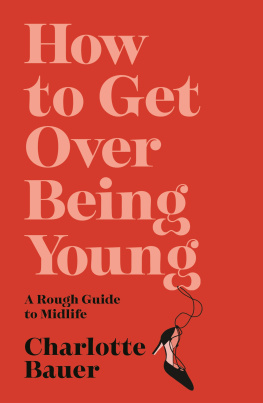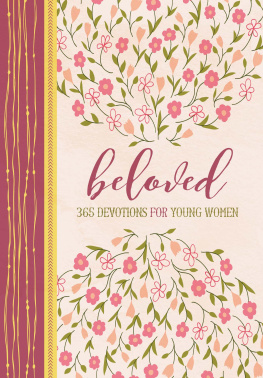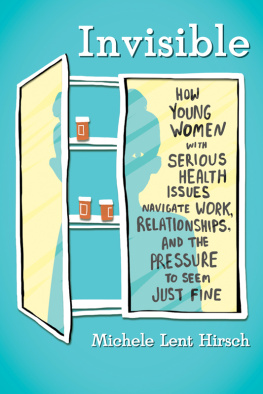

HARVEST HOUSE PUBLISHERS
EUGENE, OREGON
Unless otherwise indicated, all Scripture quotations are from The Holy Bible, New International Version, NIV. Copyright 1973, 1978, 1984, 2011 by Biblica, Inc. Used by permission. All rights reserved worldwide.
Cover design by Dugan Design Group, Bloomington, Minnesota
Cover illustration Cedric Hohnstadt
The author is represented by MacGregor Literary, Inc. of Hillsboro, Oregon.
Im Too Young to Be This Old
Copyright 1997 by Patricia Poppy Smith
Published by Harvest House Publishers
Eugene, Oregon 97402
www.harvesthousepublishers.com
Library of Congress Cataloging-in-Publication Data
Smith, Poppy, 1946-
Im too young to be this old / Poppy Smith.
p. cm.
ISBN 978-0-7369-5026-8 (pbk.)
ISBN 978-0-7369-5027-5 (eBook)
1. Middle-aged womenPsychology. 2. Middle-aged womenReligious life. 3. AgingPsychological aspects. 4. AgingReligious aspectsChristianity I. Title.
HQ1059.4.S54 2013
305.2442dc23
2012026078
All rights reserved. No part of this publication may be reproduced, stored in a retrieval system, or transmitted in any form or by any meanselectronic, mechanical, digital, photocopy, recording, or any otherexcept for brief quotations in printed reviews, without the prior permission of the publisher.
To my husband, Jim, and our two children, Malaika and Elliot. Your interest in this project delights me. I appreciate your sense of humor and your willingness to let me write honestly about life at our house.
Contents
W hat are those things under my eyes? I wailed, peering into the bathroom mirror.
Festoons, Jim, my doctor-husband, pronounced matter-of-factly. Thats the medical term for those bags under your eyes. They happen to women your age.
How sweet of you, I muttered, stalking out and leaving him grinning at his early morning humor.
Waking up and finding bags under my eyes no longer shocks me. Ive learned to live with it. I also take seriously a bit of advice from an aging movie starsleep sitting upright or, failing that, on your back with at least two pillows. When I forget and sleep on my side, in the morning I discover that my face needs ironing.
Of course, other clues tell me something is happening to me. But like most emotionally healthy women, I try to ignore them. Im amazed at how grown-up my children look. Theyre clearly too old to be mine. Something is wrong with my friends as wellthey seem to be aging prematurely. And even though my husband is ten years older than I am, it scares me when he utters words like retirement and home all day.
Help! Whats going on?
Actually, I know whats happening. Im in the muddled middle years. I have joined the ranks of millions of forty- and fiftysomething women who respond to aging by cunningly disguising gravity-prone figures and slathering on antiwrinkle creams, enjoying a state of denial for as long as possible.
Recognize yourself here?
If you do, you are likely in what I call the reluctant passage, a season of life few women, if any, enter willingly.
When does this season begin? Theres no particular birthday that, when reached, uniformly plunges a woman into midlife. Were as individual as our DNA. Most of us, however, sense changes taking place anytime from our late thirties to midforties.
Not long after I noticed these beginning signs, I frequently found myself deeply absorbed in thought, staring out of windows or gazing at blank walls. Often Id drive without noticing where I was going, brooding about my life. Had I made wise choices? Had I put God and my family first? Was I someone who could be useful in the years ahead? The answers depended largely on my mood.
In my mind, I peered cautiously at what lay ahead, sensing the beginning of a long journey across a pivotal life-bridge. I couldnt imagine myself or anyone else my age crossing this bridge with giant, eager strides. Instead, I envisioned myself leaving youths familiar territory and cautiously moving forward in a step-by-step exploration of the unknown.
The forties and fifties are a major turning point in life, taking us from the old age of youth into the youth of old age. We cant dig in our heels and say, Im not crossing over, nor can we detour around this part of our journey. We can, however, choose what attitude we will have about it.
Cringing at the Thought
Most of us cringe at the thought of entering midlife. At least I did. We laugh at over the hill and midlife jokes, so long as they are aimed at someone else. But we bristle when anyone implies we might be in any sort of crisis.
As we set foot on the reluctant passage we wonder if our marriage will hold together. Or if our children will stay in touch. Outdated stereotypes like menopause makes you crazy, life is over at forty, and dress to suit your age (why dont they just go ahead and say dowdy?) flash through our minds, causing fear and dread.
Thinking about the future can be fraught with questions: Will I be lonely? What about the dreams I still harbor? Are they forever out of reach? Am I going to feel aimlesseven useless? In the throes of these dark thoughts, aided by my bent for the dramatic, I began to visualize aging as a prelude to decay and dependence, ending in death. My overactive imagination left no room for Gods promise to never leave usto never leave me.
After a time of wallowing in the midlife blues, I decided to look at the truth. Although an increasing number of marriages break up on the rocks of midlife, the majority stay together. Most children love their parents, despite occasional hot words to the contrary. They also keep in touch, though less often than wed like.
Nor does life have to be lonely or aimless. By shedding outdated stereotypes of what you can and cant do in midlife and daring to act on your dreams, the years ahead can be the richest you have known. As for decay, dependence, and death, the key to fulfilling years ahead lies in exchanging a mentality of doom and gloom for a spirit of hopefulness. Take care of your body, deepen your dependence on God, and dont die before your actual date of decease.
Instead of cringing at the thought of being in the reluctant passage, boldly grasp your new identity as a more mature, improved model of your younger self. True, the packaging is slightly wrinkled and maybe a bit lumpy, but what does that matter?
Well, lets be truthful. For some of us, it matters a great deal.
Accepting a New Identity
Because of the age difference between my husband and me, Ive lived a long time with the illusion of being permanently young. When we went to parties or social events with people Jims age, I always felt like the young wife of an older man. Much as I wanted to hold on to my illusion, Ive had to admit the truth. Being a young wife had become a figment of my imagination.
Letting go of my youthful identity and coming to grips with one less valued by our culturemiddle-aged wifedidnt happen quickly or easily. Watching the effect that slim, alluring, eyelash-batting women twenty years my junior had on men, though, brought reality home. I realized few women my age could hope to have the same impact. Musing about growing older, I began to wonder, Maybe building a new sense of identity based on inner beauty would make aging easier to accept.
Midlife transition takes time. Driving across a bridge from the United States into Canada is an instant transition from one country to another. Moving from one perception of self to another is a slow process. For a while our eyes keep straying to lifes rearview mirror. We are gripped by a sense of loss and a longing to go back in time.
Next page
